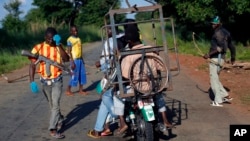The U.N. Food and Agriculture Organization says the Central African Republic needs to find more work for young people if it wants to avoid further violence. The agency is working to show how gardening can be career opportunity for youth involved with armed groups.
In a village 26 kilometers north of Bangui, drummers welcome FAO workers who have come to see how a group here is working to grow water melons and other produce.
Villagers say until recently gardener Levy Koulbe was the head of a group of anti-balaka, a militia from mainly Christian communities. The anti-balaka started out as self-defense groups, but increasingly are regarded as bandits.
Going green
Koulbe said he is one of the anti-balaka who came from the bush, and when they got to Bangui no one looked after them, so they suffered. He said he is grateful now that one of his relatives, Louis Koro, advised them to join this farmers’ group and learn gardening. Koro also is president of this gardeners’ group.
As for payment, Koulbe said they were told they might each get about $6.50 a day, but so far they are not being paid that. Regardless, he said he is glad to be learning gardening as he thinks it will be profitable for him in future.
Koro confirms there is not much pay. "To say the workers are paid would be an overstatement. We have to admit there is no salary, but we share the crumbs that we have -- sometimes the workers get coffee, plantains, taro and so forth," he said.
Gardening can be particularly profitable around Bangui, where a kilogram of watermelons sell for more than two dollars, and Koro does sometimes pay the workers.
Isiais Koro is another ex-anti-balaka in the group. He said he is better off gardening than manning a checkpoint for the anti-balaka because they do not pay anything at the checkpoints these days. The militia can only shake down pedestrians carrying bundles of wood and women carrying farm produce.
He explained that it has become harder to erect roadblocks around Bangui as the French or U.N. peacekeepers soon dismantle them. He said as a result, he was getting less than a dollar a day in the anti-balaka, whereas working as a gardener he is fed, and sometimes gets $2 per day.
Cyriaque Bondo is another of the ex-anti-balaka turned gardener. He told VOA he was making about $5 a day with the anti-balaka, but he prefers working for Louis Koro’s association because he can work for other villagers, too, who also pay him.
Working for the association may not pay much, but because Koro is an influential man locally he enables the ex-anti-balaka to be accepted by the community, despite crimes they may have committed.
Farmer field schools
This year the Food and Agriculture Organization aims to start what it calls farmer field schools in villages across the country. These are regular meetings of farmers who want to work together and learn together, something like Koro’s association.
FAO says farmer field schools can help integrate ex-combatants into village life. The idea is not to give them preferential treatment, but to encourage the inclusion of marginalized young people, so that villagers can accept them.
In Bangui recently, FAO emergencies expert Pierre Vauthier spelled out what is at stake.
"You must not forget," he said, "that it is with the young that you build the future, and if you want peace in 2015, 2016 and 2020 then it is with 15-year-olds and 20-year-olds that you must work, as well as with the others."




